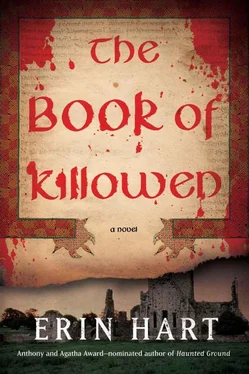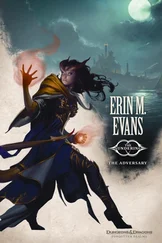She followed in his footsteps, passing the sign that pointed to the cottages. The broad macadam path cut through a gentle slope that was covered with green mounds, hundreds of moss-covered stones like an army of turtles marching through the oak grove. She spied three or four small dwellings farther down the path, glimpses of thatch and stone and whitewash through the leaves. Towering above the sparse undergrowth of saplings stood a few stout old trees and one giant in particular whose girth must have been twenty feet or more. Nora slowed her pace and circled the massive tree, resting her palm on ancient bark that had grown into folds upon itself, looking up into gnarled branches that stretched outward like enormous crooked arms that drooped gracefully toward the earth, practically begging to be climbed. Garish green moss grew straight up the trunk and clung to a snake-like root that slithered into leaf mold underfoot. How long had this ancient life been rooted here? What ravages of wind and weather, what natural and man-made firestorms had it withstood through all those centuries?
Nora leaned forward and peered up into the branches. She could, if she wished, step from one limb to another and vanish up into its leaves. Testing her balance, she set one foot gingerly on the lowest limb, then stepped quickly up the ladder of branches. Soon she was fifteen feet above the ground, lost amid the rustling foliage. Their thick leaves gave oak trees a particular sound, a deeper timbre than the music of sycamores or beech trees or firs. Nora glanced down and felt a little dizzy. What was she doing, acting like a child? And how on earth was she going to get down?
A growing murmur of voices came from back along the path. The slouchy young man walked beside Mairéad Broome. Her cottage must be along this path, but they seemed headed back to the main house, passing under the oak where Nora was hidden.
“I had to give him the money,” the young man was saying. “Coming here like that, in broad daylight? It’s not like I had a choice, Mairéad.”
Mairéad Broome stopped just under the tree, and Nora held her breath. How could they not hear her or at least sense her presence above them? She hung on tight, pressed against the oak’s mighty trunk.
“No, you did the right thing, Graham.”
“The trouble is, he’ll just keep asking for more, unless we do something.”
“What can we do? We’d all be in jeopardy if he says anything, and I won’t risk that.”
“But he’s using you, Mairéad.”
“I know he is. Just leave it be, please, Graham—”
He stopped her saying any more with a fervent kiss, pressing her back against the oak.
Nora nearly had to stifle a cry as a fat acorn dropped from a branch directly in front of her eyes, glancing like a stone off Graham’s unprotected head.
“Ow!” he yelped, jumping back. “Jesus!” One hand reached up to rub the spot where the acorn had made contact, but to Nora’s relief, he glanced up only briefly and didn’t see her. The acorn had provided sufficient disruption, however, and the pair moved on and were soon out of earshot.
Nora slowly let out her breath and started to climb down the same branches that had been her ladder on the way up. Reaching out to find a grip, she noticed a small branch bearing a spray of leaves and a marble-sized brown sphere. There was no hole in it, like those she’d seen in Martin Gwynne’s studio, but the thing was definitely not an acorn. Nora felt the lump in her pocket and looked around, spying other brown galls on the branches all around her. She hadn’t even noticed them on the way up. She plucked the false fruit from the tree, slipped it into her pocket, and climbed carefully to the ground.
It was difficult to imagine that anyone she’d met so far at Killowen could have been responsible for Benedict Kavanagh’s death, but the oak galls must be a significant clue. From what she’d seen in the morgue, Kavanagh’s death had been planned in some detail. And the anger felt personal. What could Kavanagh possibly have done to warrant such a dreadful vengeance? A little research might be in order.
She found Joseph and Eliana in the kitchen. “I’m back,” she said. “Thought it might be time to give Eliana a well-deserved break.”
The girl shrugged. “I don’t mind.”
“Wouldn’t you like to take a walk or read a book, anything?”
Eliana finally nodded, eyes downcast. She headed for the door and turned as she crossed the threshold. “One hour?” It sounded as if she was being forced to stay away for an hour, rather than being granted her liberty.
“I’m sure you’ll find plenty to do,” Nora said. She turned back to Joseph. “You and I are going to do a bit of research. Stay right here—I’ll be back.”
Nora fetched her laptop from upstairs. She reached into her pocket for the oak galls she’d collected from the studio and the wood and showed them to Joseph. “Here’s what we’re looking for,” she said, setting them down on the table in front of him.
His eyes seemed to light up. “Bugallas,” he said. “ Tinta, la tinta! Uncle!”
Nora wondered if he made as little sense in Spanish as he did in English.
“Uncle!” Joseph said again. He moved his right hand, miming the act of writing.
Nora looked at him. “Do you know what this is?” He nodded slowly, reaching out for the gall she held in front of him.
“Bugalla,” he said. He held up the second gall as well. “Dos bugallas-uh-uh-duh—roble.”
“You’ve seen something like this before?”
“Sí, sí, la medicina.”
Nora couldn’t quite believe her ears. “ La medicina —for medicine, you mean?”
Eliana’s voice came from the doorway. She was back already. “And ‘la tinta’ is ink—or perhaps, em, what do you call this… for changing colors.” She gestured to her clothing.
“You mean dye?” Nora asked.
“Yes, dye, that’s it.”
“What about ‘ bugalla ’? Is that a real word?”
“I don’t know,” said Eliana. “I never heard it before.”
Nora swung her laptop around and found an online translation engine. She typed bugalla , set the boxes for Spanish to English, and pressed Translate.
The answer came in a flash: oak gall. Was it possible Joseph had come across these odd little things in Chile?
“Amargura,” Joseph murmured. He was looking now at Eliana. “Mi dolor. La cara de mi dolor.”
Nora observed them both. “I can see that you understand. He is speaking Spanish, right? Is it something about a friend?”
The girl shook her head. “No, no—he says amargura , em… ‘bitterness,’ and…” She hesitated.
“What is it, Eliana?” Nora asked. “What else did he say?”
“He said, ‘My sorrow. The face of my sorrow.’”
“What does that mean? Is it some sort of expression?”
“I don’t know.” The girl seemed bewildered and suddenly close to tears.
“Will you excuse us for just one second?” Nora asked Joseph. She took Eliana aside. “I’m so sorry about all this. We ought to have warned you. The stroke seems to have made Joseph’s emotions a bit more volatile. I know he’s not saying or doing things on purpose to upset you. I’m not sure where all these cryptic phrases are coming from, and I’m not sure he knows either. If you’re finding it too much, we can try to contact the agency and see if they can send someone else.”
“No! I’m not upset. Please, don’t send me away.”
“No one wants to send you away, Eliana. I know you’re trying your best. But if he upsets you, if you’re not comfortable, we can ask for someone with more experience—”
Читать дальше












